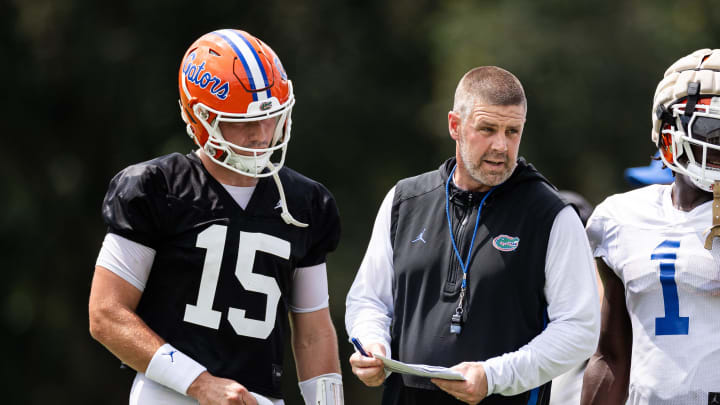New Tool for Graham Mertz, Florida Gators should Improve Offense

In the world of college football, you cannot understate the critical need of communication, especially for quarterbacks. Graham Mertz, in his swan song for the Florida Gators, will enjoy a new tool in his repertoire.
In 2024, NCAA teams will use a new in-helmet communication. Mertz will connect completely to the sideline via helmet. Last week, Mertz articulated his thoughts regarding the new technology during media availability.
Test Fire
During the second scrimmage, Florida implemented the new communication. Mertz, so far, seemed rather impressed. Furthermore, he raised interesting questions about its uses and how it would help. Simultaneously, Mertz asked long-term and immediate questions.
"Yeah, it’s a great thing," said Mertz. "I think it’s interesting like, you think about an NFL game, an NFL away game. How loud does it really get compared to at Tennessee or in the Swamp? You think of an away team coming in here. How would that impact it. There’s a lot of different wrinkles to it. We’re still working on it every day. I think it’s a great addition. There’s so many different ways you can use it that I’m probably not going to explain in a press conference.”
Hindsight
During his days at Wisconsin, Mertz struggled with bland, ineffective coaching preparation. To him, possessing that level of improved technology could bolster the play of any younger quarterback.
“Yeah, it’s just being able to get extra coaching points on the fly is huge," said Mertz. "You think about, when I was coming up, I was getting the signal, the 20-word signal trying to remember it, alright that’s what the call should be on third-and-long, this is the first three, ok, now I can remember it. Obviously, you might still need to have the signals but bypass that and have the coach in your ear just getting coaching points on certain plays that can help you play faster, trust your preparation. It’s been great. Especially as a young player.”
Hurry Up
Like many coaches, Billy Napier feels that his offense could play with pace. For this reason, according to Mertz, the in-helmet apparatus makes this possible.
“Yeah, I think that’s the cool thing about the in-helmet communication is you can use it in so many different ways," said Mertz. "You can slow the game down, you can huddle up. You can speed it up when you need to. There’s so many different ways you can utilize it. Of course, that’s been an emphasis for us going into camp, throughout camp, is just pushing our pace. Getting up to the ball and getting set. You know the helmet thing cuts out at 15 seconds. How much information can you get out before that cuts off?”
Overview
Graham Mertz and the Florida Gators, like every other FBS team, will find in-helmet comms helpful. Now, that technology will never act as a cure-all for poor execution. With that said, the onus still resides with Mertz, and to a greater extent, Napier. The communication device remains a tool in an arsenal, heavily dependent on operator performance.
